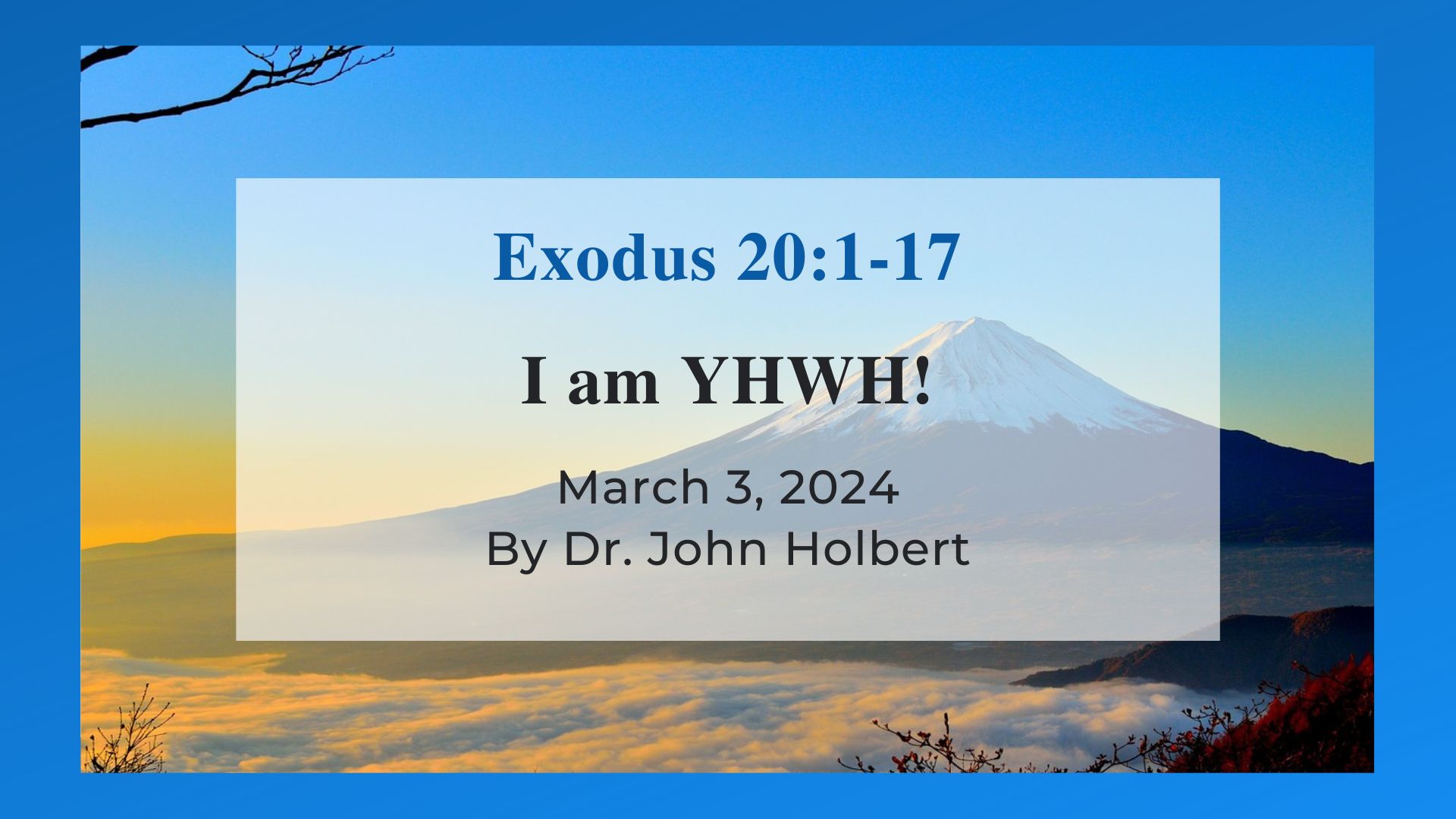I am YHWH! - Reflections on Exodus 20:1-17
by Dr. John Holbert on Monday, February 26, 2024

I am YHWH!
Exodus 20:1-17
The Peripatetic Hebrew Bible Preacher
Whenever one of the lists of the Ten Words, or Ten Commandments as they are more popularly known, comes up in the lectionary, I am quick to say to every preacher: “Do not, under any circumstances, attempt a sermon that tries (and inevitably fails) to cover all ten!” More than a few preachers, seasoned and rookie, have foundered on the shoals of the mighty ten. Choose one, and have at it, say I!
Following my own sage advice, I have decided for this third Sunday in Lent, to choose word or commandment #1 in order to continue the Lenten theme I have assayed for this year: who is this God anyway? In Lent one, I pointed us to the God of the rainbow, or the war bow, either image suggesting that our God has given up forever angry assaults against the people whom God created, instead hanging the divine bow in the clouds as a reminder to Godself (!) to remember the covenant God forged with Noah and his descendants. In Lent Two, we witnessed a God who is able, beyond all expectations, to fulfill the promises that God made with the whole earth, employing Abraham and Sarah to effect those promises, unperfect vessels though they be.
Today in Lent three, we are presented with the famous Ten. I choose the first of them for examination because it continues this theme of the character and person of the God we worship uniquely in the Lenten season. There is immediately a problem that needs addressing before we can begin: just which IS the first commandment? Most Protestant Christians, following the Westminster catechism, assume that the first commandment is to be found in Ex.20:3: “You must not have other gods before me” (or perhaps more boldly “in my face”). In other words, the list of the ten for many do not include the opening words of the chapter, reasoning that those words are hardly commands, but are rather an announcement of the nature and purpose of YHWH. I agree that they do not constitute any sort of command, but I heartily disagree that they are thereby to be excluded from the ten.
In Judaism, in fact, Ex.20:2, including the opening words, is the first commandment. I must agree, because without those ringing words of that verse, none of the other nine commands/statements find any firm grounding in the will and way of YHWH. In Ex.20:2 we discover more precisely who it is who is issuing these great words, words that have echoed down the millennia since their first formulation.
They can be translated in at least two different ways: “I, YHWH, am your God,” my preferred reading, or the more traditional “I am YHWH, your God” (NRSV among many others). There seems little difference here, but I suggest that the first emphasizes more exactly what the Hebrew text emphasizes, namely that it is no other than YHWH who is speaking here, and no other god can find any place in such utterance. But just who is this YHWH? The remainder of the sentence makes it plain: “Who brought you out of the land of Egypt, from the house of slavery.” Here is the essence of YHWH who is always known not merely by a vague theological speculation but by what YHWH has done and will do. It was YHWH who made the exodus from Egypt possible, the central story of Israel’s life and existence, the lode star by which the people have survived and continue to survive. YHWH has acted and will continue to act in power and love for the people whom God has created.
Only after that is crystal clear, the fact of the active YHWH, can we fully understand the second part of the statement: “There must not be for you other gods over against my face.” Once it is made clear that it was YHWH that gave Israel life at the Sea of Reeds (traditional but wrong “Red Sea”), no other god need apply for divine status, and anyone who would foolishly claim that some other deity inhabits the divine world is quite mistaken and grievously in error. That wonderful exilic prophet, 2 Isaiah, says this with unforgettable power: “Have you not known? Have you not heard? Has it not been told to you from the first?…To whom will you compare me, who is my equal?” (Is.40:21, 25). And later: “I am YHWH, and there is no other; besides me there is no God” (Is.45:5).
Our Lenten journey leads us to this God, the only God of the universe, the one who is finally alone in creation and in the sustaining of the creation. In short, the first commandment, found here in Exodus 20 and also in Deuteronomy 5, demonstrates with supreme clarity the nature of the God who calls us to praise and to service, a God ever active on our behalf, ever concerned to offer us a love that will not let us go, bidding us to offer that sort of love to all the creation, friend and foe alike.
